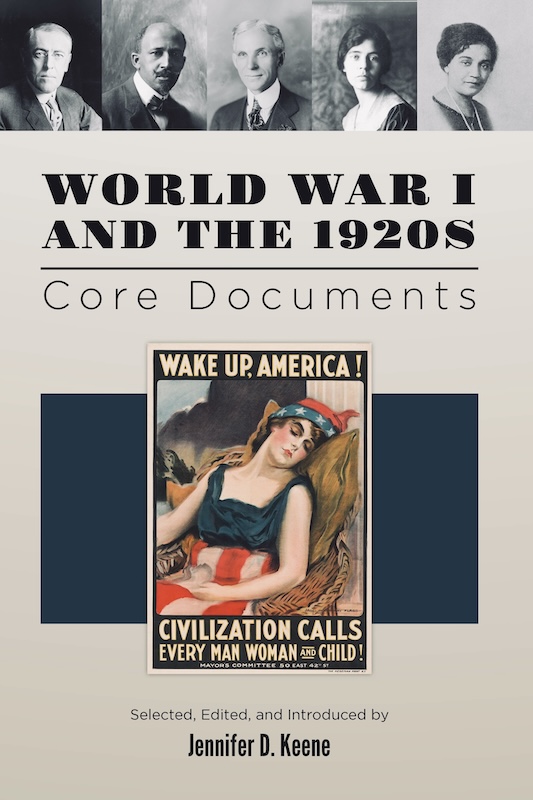World War I and the 1920s
Selected and introduced by Jennifer D. Keene

We live in the shadow of the era illuminated by the documents in this volume. During World War I and the 1920s, the United States experienced economic, social, political and cultural changes that marked the beginning of modern America. Industrialization increased; a consumer economy developed; the modern civil rights movement was born; women won the right to vote, as their roles and status continued to change; and questions of free speech and other civil liberties arose. The documents in this volume explore these and other issues that in various ways continue to mark American life. Topics include:
- World War I, the League of Nations, the Fourteen Points Plan and the Treaty of Versailles
- Civil rights, the Black soldier experience, Jim Crow and the Great Migration
- Antiwar dissent, pacifism, neutrality, challenges to free speech, anti-communism and anti-socialism
- Labor unions, economic change in the 1920s, the growth of stock market and rising prosperity
- Social change, suffrage and the rise of the New Woman, fundamentalism and modernism, and Prohibition
African Americans
- W. E. B. Du Bois, “Close Ranks,” July 1918
- W. E. B. Du Bois, “Returning Soldiers,” May 1919
- Charles R. Isum, A Black Soldier’s Experience in France, May 17, 1919
- Chicago Defender, Navigating the North, May 17, 1919
- Jessie Fauset, “Some Notes on Color,” March 1922
- Alain Locke, “Enter the New Negro,” March 1925
Antiwar Dissent
- Alfred Bryan, “I Didn’t Raise My Boy to a Soldier,” 1915
- George W. Norris, Opposition to War, April 4, 1917
- Sixty-fifth U.S. Congress, Espionage Act, June 15, 1917
- Socialist Party, “Wake Up America!” August 1917
- Sixty-fifth U.S. Congress, Sedition Act, May 16, 1918
Civil Liberties
- Sixty-fifth U.S. Congress, Espionage Act, June 15, 1917
- Doris Stevens, “Alice Paul in Prison,” 1917
- Socialist Party, “Wake Up America!” August 1917
- Sixty-fifth U.S. Congress, Sedition Act, May 16, 1918
- Oliver Wendell Holmes Jr., Schenck v. United States, March 3, 1919
- A. Mitchell Palmer, “The Case against the ‘Reds,’” February 1920
Cultural Conflict
- A. Mitchell Palmer, “The Case against the ‘Reds,’” February 1920
- William Jennings Bryan, Debating Darwinism: “God and Evolution,” February 26, 1922
- Harry Emerson Fosdick, Debating Darwinism: “Evolution and Mr. Bryan,” March 12, 1922
- Alain Locke, “Enter the New Negro,” March 1925
- North American Review, Prohibition: Success or Failure? June–September 1925
- William Oscar Saunders, “Me and My Flapper Daughters,” August 1927
Economy
- Food Administration, “Food Will Win the War,” 1917
- Lucille Fee, Letters from a Working Wife, Fall 1918
- Literary Digest, “Henry Ford’s Five-Day Week,” April 29, 1922
- Woman’s Home Companion, “My Everyday Problems,” July 1923
- North American Review, Prohibition: Success or Failure? June–September 1925
- Sears, Roebuck and Co., Mail-Order Houses, 1927
- John J. Raskob, “Everybody Ought to Be Rich,” August 1929
Foreign Policy
- Woodrow Wilson, Declaration of Neutrality, August 19, 1914
- Woodrow Wilson, Responding to German Submarine Warfare, April 19, 1916
- Woodrow Wilson, “The World Must Be Made Safe for Democracy,” April 2, 1917
- Woodrow Wilson, The Fourteen Points, January 8, 1918
- Henry Cabot Lodge, Opposing the League of Nations, August 12, 1919
- Woodrow Wilson, Defending the Versailles Peace Treaty, September 25, 1919
- Frank B. Kellogg, Renouncing War: The Kellogg-Briand Pact, June 11, 1928
Path to War, 1914–1917
- Woodrow Wilson, Declaration of Neutrality, August 19, 1914
- Fred Spear, “Enlist,” 1915
- Woodrow Wilson, Responding to German Submarine Warfare, April 19, 1916
- Arthur, Zimmermann, The Zimmermann Telegram, January 16, 1917
- Woodrow Wilson, “The World Must Be Made Safe for Democracy,” April 2, 1917
- George W. Norris, Opposition to War, April 4, 1917
Peace
- Woodrow Wilson, The Fourteen Points, January 8, 1918
- Henry Cabot Lodge, Opposing the League of Nations, August 12, 1919
- Woodrow Wilson, Defending the Versailles Peace Treaty, September 25, 1919
- Warren G. Harding, Laying to Rest an Unknown American Soldier, November 11, 1921
- Frank B. Kellogg, Renouncing War: The Kellogg-Briand Pact, June 11, 1928
Propaganda
- Fred Spear, “Enlist,” 1915
- James Montgomery Flagg, Recruitment Poster, 1917
- Socialist Party, “Wake Up America!” August 1917
- Food Administration, “Food Will Win the War,” 1917
Soldiers
- Sergeant A. Judson Hanna and Lieutenant Colonel Ashby Williams, Fighting in World War I, September 1918
- Charles R. Isum, A Black Soldier’s Experience in France, May 17, 1919
- Warren G. Harding, Laying to Rest an Unknown American Soldier, November 11, 1921
Women
- Doris Stevens, “Alice Paul in Prison,” 1917
- Carrie Chapman Catt, Open Address to the U.S. Congress, November 1917
- Food Administration, “Food Will Win the War,” 1917
- Lucille Fee, Letters from a Working Wife, Fall 1918
- Jessie Fauset, “Some Notes on Color,” March 1922
- Woman’s Home Companion, “My Everyday Problems,” July 1923
- William Oscar Saunders, “Me and My Flapper Daughters,” August 1927
